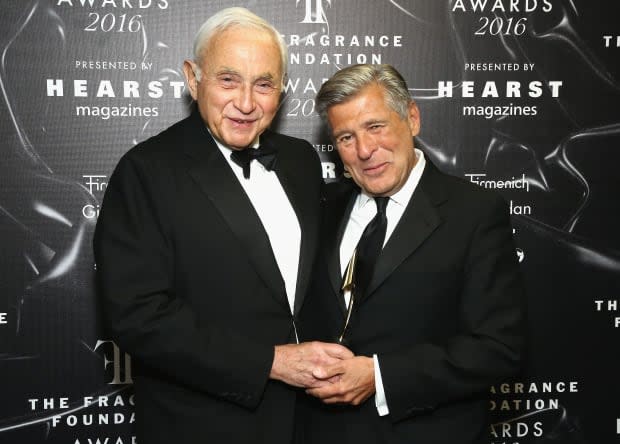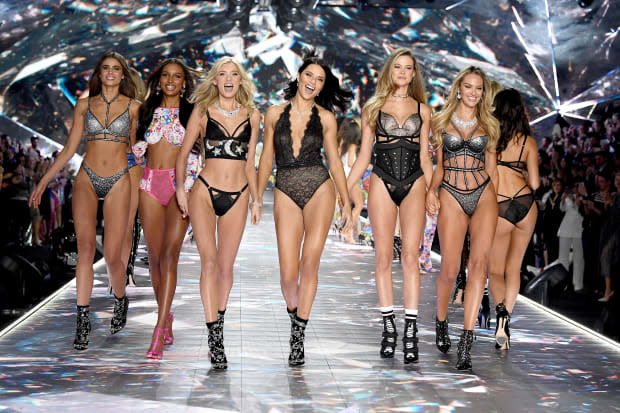Victoria's Secret Acquired, Leslie Wexner to Step Down
The retail executive founded L Brands — which owned Victoria's Secret and Bath & Body Works — in 1963.

Victoria's Secret officially has a new owner: Sycamore Partners, a private equity firm, acquired the lingerie giant from L Brands in a deal that makes it a privately held company. Meanwhile, Bath & Body Works will exist as a standalone public company, and Leslie Wexner, L Brands founder and longtime Victoria's Secret executive, is stepping down.
L Brands announced the news on Thursday along with a few details about the transaction: The new, privately held Victoria's Secret has a "total enterprise value" of $1.1 billion; Sycamore acquired 55% of the business for approximately $525 million. (This took into account "certain liabilities" and effectively values the company at about $955 million.) L Brands, which will use that money to reduce debt, will retail the remaining 45% stake in the lingerie company "to enable its shareholders to meaningfully participate in the upside potential of these businesses," per the press release. The deal encompasses the Victoria's Secret Lingerie, Victoria's Secret Beauty and Pink brands.
"We believe the separation of Victoria’s Secret Lingerie, Victoria's Secret Beauty and PINK into a privately held company provides the best path to restoring these businesses to their historic levels of profitability and growth," Wexner said in a statement. "Sycamore, which has deep experience in the retail industry and a superior track record of success, will bring a fresh perspective and greater focus to the business."
Though he's stepping down as chief executive officer and chairman of the board of L Brands, Wexner will remain on the board as chairman emeritus. Andrew Meslow, currently chief operating officer of Bath & Body Works, has been promoted to chief executive officer of Bath & Body Works and will become chief executive officer of L Brands once the transaction closes.
The news that Wexner would be leaving L Brands was first reported by The Wall Street Journal on Jan. 29. (That same day, the company's stock spiked 12%, per CNN.) The Journal also noted that he was "exploring strategic alternatives" for Victoria's Secret, specifically, which could include "a full or partial sale."
Wexner is the founder, chairman and, until this announcement, chief executive officer of L Brands. He started the company in 1963, as The Limited, which grew from one store into a multi-brand retail conglomerate spanning apparel, beauty and, of course, lingerie. (According to the Wall Street Journal, Wexner has a 17% stake in the company.)
Related Stories:
Victoria's Secret CEO Admits It Has Some Catching Up to Do When It Comes to Inclusive Marketing
Victoria's Secret's Newly Chosen Angels Prove the Company Really, Truly Doesn't Get It
The Complicated, Messy Reality of 'Canceling' Victoria's Secret
L Brands acquired Victoria's Secret (arguably its most talked-about brand as of late) in 1982 and grew it into the international behemoth it is today. But in recent years, the brand's image has fallen out of favor with shoppers — particularly, due to the lack of size and body diversity in its casting across the board and its famously airbrushed, highly-stylized catalog. Ed Razek, Victoria's Secret's longtime CMO and the man credited with popularizing its sexualized imagery, stepped down in August 2019; its splashy annual fashion show was also canceled, though the brand said it was exploring the possibility of a "new kind of event."

Meanwhile, Wexner's ties to Jeffrey Epstein — who managed his personal finances for almost two decades — began to raise questions and were the subject of a review from an external legal team. (The executive maintains that he had no knowledge of the financier's alleged crimes.) Wexner addressed the matter during L Brands investor meetings in September.
The end of the year wasn't great for Victoria's Secret, either. The company had layoffs at its Columbus, Ohio headquarters in October The New York Times reported. (More are expected to come at L Brands following Wexner's departure, another report from the Times suggested.) During the 2019 holiday season, same-store sales at Victoria's Secret across stores and direct channels went down by 12% (compared to last year's 4% dip for the same period), according to CNBC — despite efforts to diversify the brand's marketing with non-sample-sized models. (Needless to say, Sycamore has its work cut out for it.)
Earlier this month, The New York Times published a report detailing a culture of misogyny and harassment at Victoria's Secret that affected both its employees and the models it cast in campaigns and its fashion show — and that went all the way up the ladder to Wexner and Razek.
"What was most alarming to me, as someone who was always raised as an independent woman, was just how ingrained this behavior was," Casey Crowe Taylor, a former public relations staffer at the brand, told the Times. "This abuse was just laughed off and accepted as normal. It was almost like brainwashing. And anyone who tried to do anything about it wasn’t just ignored. They were punished."
In response to inquiries from the Times about its reporting, a spokesperson for L Brands said on behalf of the board of directors: "We regret any instance where we did not achieve this objective and are fully committed to continuous improvement and complete accountability."
Want more Fashionista? Sign up for our daily newsletter and get us directly in your inbox.

 money
money 